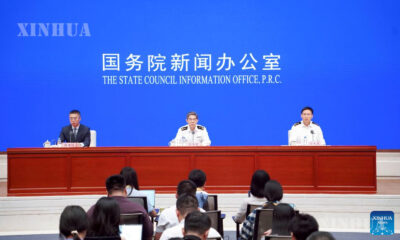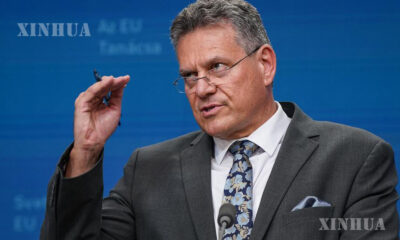Media
အမေရိကန်-ဂျပန်-တောင်ကိုရီးယား သုံးနိုင်ငံ အင်ဒို-ပစိဖိတ်ဆွေးနွေးပွဲဆိုင်ရာ ပူးတွဲကြေညာချက်ကို တရုတ်နိုင်ငံခြားရေးဝန်ကြီးဌာန ငြင်းပယ်
ပေကျင်း၊ ဇန်နဝါရီ ၁၀ ရက် (ဆင်ဟွာ)
အမေရိကန်၊ ဂျပန်နှင့် တောင်ကိုရီးယား နိုင်ငံများကြား သုံးနိုင်ငံ အင်ဒို-ပစိဖိတ်ဆွေးနွေးပွဲမှ ထုတ်ပြန်သော ပူးတွဲကြေညာချက်ကို တရုတ်နိုင်ငံခြားရေးဝန်ကြီးဌာန ပြောရေးဆိုခွင့်ရှိသူက ငြင်းပယ်လိုက်ကြောင်း သိရသည်။
အမေရိကန်နိုင်ငံခြားရေးဝန်ကြီးဌာနက ဇန်နဝါရီ ၆ ရက်တွင် ထုတ်ပြန်လိုက်သော အဆိုပါ ပူးတွဲကြေညာချက်နှင့် ပတ်သက်၍ နေ့စဉ်သတင်းစာရှင်းလင်းပွဲ၌ မေးမြန်းမှုအပေါ် ပြောရေးဆိုခွင့်ရှိသူ မော်နင်က အထက်ပါအတိုင်း မှတ်ချက်ပြုဖြေကြားခဲ့ခြင်းဖြစ်သည်။ ပူးတွဲကြေညာချက်၌ တောင်တရုတ်ပင်လယ်အတွင်း တရုတ်နိုင်ငံ၏ ပင်လယ်ရေကြောင်းဆိုင်ရာပြောကြားမှုနှင့် တိုးမြှင့်လာသော ပြုမူဆောင်ရွက်မှုအပေါ် သုံးနိုင်ငံက စိုးရိမ်ပူပန်မှုရှိကြောင်း ဖော်ပြထားပြီး အမေရိကန်၊ ဂျပန်နှင့် တောင်ကိုရီးယားတို့က “နိုင်ငံတကာဥပဒေနှင့်အညီ ၎င်းတို့သုံးနိုင်ငံ၏ ရေကြောင်းလုံခြုံရေးနှင့် တရားဥပဒေစိုးမိုးရေးပူးပေါင်းဆောင်ရွက်မှုကို ဆက်လက်ဆောင်ရွက်သွားမည်” ဟု ပြောကြားထားသည်။
ထို့ပြင် ထိုင်ဝမ်ရေလက်ကြားတစ်ခွင် ငြိမ်းချမ်းရေးနှင့် တည်ငြိမ်ရေးသည် နိုင်ငံတကာအသိုင်းအဝိုင်း၏ လုံခြုံရေးနှင့် သာယာဝပြောရေးအတွက် မရှိမဖြစ်လိုအပ်ကြောင်း သုံးနိုင်ငံက ထပ်လောင်းပြောကြားခဲ့သည်။
တရုတ်နိုင်ငံခြားရေးဝန်ကြီးဌာန ပြောရေးဆိုခွင့်ရှိသူ မော်နင်က တောင်တရုတ်ပင်လယ် အခြေအနေသည် ယေဘုယျအားဖြင့် တည်ငြိမ်လျက်ရှိကြောင်း၊ တရုတ်နိုင်ငံအနေဖြင့် ၎င်းတို့၏ ကိုယ်ပိုင်နယ်မြေပိုင်နက် ပြည့်စုံမှု၊ ပင်လယ်ရေကြောင်း အခွင့်အရေးနှင့် ရေကြောင်း အကျိုးစီးပွားများကို ထိန်းသိမ်းစောင့်ရှောက်ရန် ကတိပြုထားသလို ဆက်စပ်သောနိုင်ငံအသီးသီးနှင့် ဆွေးနွေး ညှိနှိုင်းဆောင်ရွက်မှုမှတစ်ဆင့် မတူကွဲပြားမှုများကို သင့်တင့်လျောက်ပတ်စွာ စီမံဆောင်ရွက်လျက်ရှိကြောင်း ပြောကြားခဲ့သည်။
“ထိုင်ဝမ်က တရုတ်နိုင်ငံရဲ့ နယ်မြေပိုင်နက်ရဲ့ ခွဲခြား၍မရသောအစိတ်အပိုင်းတစ်ရပ်ဖြစ်တယ်ဆိုတာ ကျွန်မ အလေးအနက်ပြောကြားလိုပါတယ်။ ထိုင်ဝမ်အရေးကလည်း တရုတ်နိုင်ငံရဲ့ ပြည်တွင်းရေးသာဖြစ်ပြီး ပြည်ပဝင်ရောက်စွက်ဖက်မှုကိုလည်း ခွင့်ပြုမှာမဟုတ်ပါဘူး” ဟု မော်က ဆိုသည်။
ထိုင်ဝမ်ရေလက်ကြား တည်ငြိမ် အေးချမ်းမှုကို ထိန်းသိမ်းရန် အဓိကအချက်မှာ တရုတ်တစ်နိုင်ငံတည်း မူဝါဒကို ထိန်းသိမ်းစောင့်ရှောက်ခြင်းနှင့် “ထိုင်ဝမ်သီးခြားရပ်တည်ရေး” အတွက် ခွဲထွက်ရေးလုပ်ဆောင်သူများကို အခိုင်အမာကန့်ကွက်ခြင်းပင် ဖြစ်ကြောင်း ၎င်းက ဆိုသည်။
အာရှ-ပစိဖိတ်ဒေသည် ပူးပေါင်းဆောင်ရွက်မှု၏ ရှေ့ဆောင်လမ်းပြသာဖြစ်ပြီး ပထဝီနိုင်ငံရေး ယှဉ်ပြိုင်မှုများအတွက် ကစားကွက်နေရာမဟုတ်ကြောင်း မော်က အလေးထားပြောခဲ့သည်။
“ဆက်စပ်သောနိုင်ငံတွေအနေနဲ့ ဒေသတွင်းနိုင်ငံတွေရဲ့ ငြိမ်းချမ်းရေးနဲ့ တည်ငြိမ်ရေး ကြိုးပမ်းအားထုတ်မှုတွေကို အလေးအနက်ထား လေးစားဖို့၊ စစ်အေးခေတ်သဘောထားကို ရှောင်ရှားဖို့၊ အုပ်စုဖွဲ့ ထိပ်တိုက်တွေ့ဆုံမှု ဖန်တီးတာကို ရပ်တန့်ဖို့နဲ့ ဒေသတွင်း တင်းမာမှုတွေကို လျှော့ချဖို့ တိုက်တွန်းလိုက်ပါတယ်” ဟု မော်က ပြောကြားခဲ့သည်။ (Xinhua)
………………………………
(English Version)
Chinese FM refutes joint statement on U.S.-Japan-ROK Trilateral Indo-Pacific Dialogue
BEIJING, Jan. 8 (Xinhua) — A Chinese foreign ministry spokesperson on Monday refuted a joint statement released by the Trilateral Indo-Pacific Dialogue between the United States, Japan and the Republic of Korea (ROK).
Spokesperson Mao Ning made the remarks at a daily press briefing in response to a query on the joint statement, which was released on Jan. 6 by the U.S. State Department. It expressed the three countries’ concerns over China’s maritime claims in the South China Sea and “escalatory behavior,” and said that the United States, Japan and the ROK “will continue their trilateral maritime security and law enforcement cooperation in accordance with international law.”
The three countries also reaffirmed that peace and stability across the Taiwan Strait are indispensable to security and prosperity in the international community.
She said that the situation in the South China Sea is generally stable. China is committed to safeguarding its own territorial sovereignty, maritime rights and maritime interests, while managing differences properly with countries directly concerned through dialogue and consultation.
“I want to stress that Taiwan is an inalienable part of China’s territory, and the Taiwan question is entirely China’s internal affairs and brooks no foreign interference,” Mao said.
She said that the key to maintaining peace and stability in the Taiwan Strait is upholding the one-China principle and firmly opposing separatist moves toward “Taiwan independence.”
The Asia-Pacific region is a cooperation pacesetter, not a chessboard for geopolitical contests, she stressed.
“We urge relevant parties to earnestly respect regional countries’ efforts toward peace and stability, abandon the Cold War mentality, stop creating bloc confrontation, and cease to fuel tensions in the region,” Mao added.






